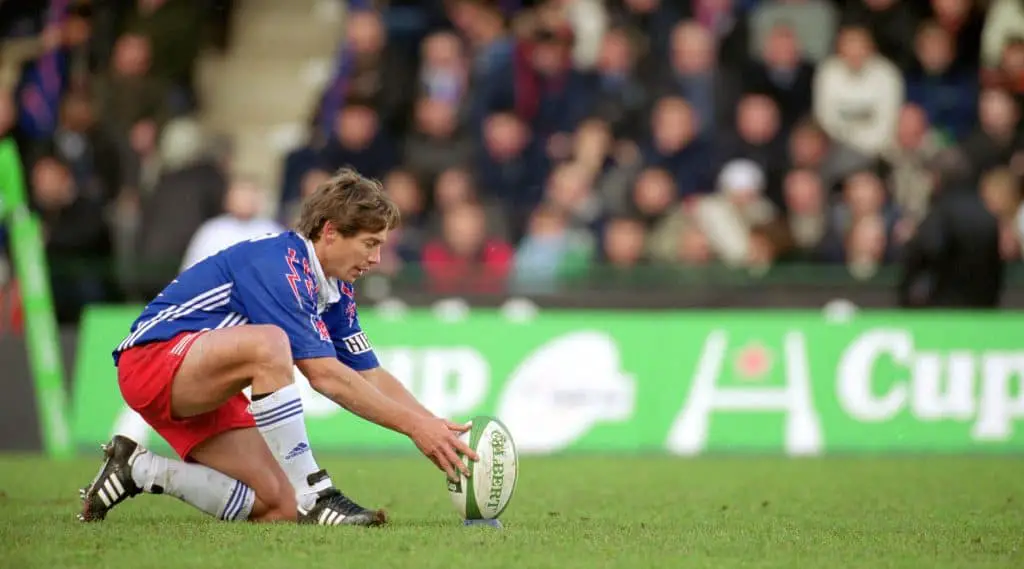There is an awful lot of kicking in rugby. And if a referee is in a bad mood a rugby match can easily feature dozens of penalty kicks. What can rugby players do to stop prevent penalty goals? Let’s find out

Can You Block A Penalty Kick In Rugby?
Rugby players can not block a penalty. They must be at least 10m back from the kicker and remain stationary. They can not obstruct or distract the kicker in anyway. This is in contrast to a conversion where player’s can attempt a charge down and block the kick.
Charging down and running towards a player taking a penalty has always been illegal in rugby. However, in the 90s rugby athletes started taking advantage of a loophole in the rules. Instead of charging down the kick they would lift a player in the air who would either catch the ball or knock it back before it went over the goal posts. John Eales the expert lineout jumper from Australia was particularly adept at this movement.
The lifting and jumping strategy didn’t last for long and has now been outlawed in rugby. Players are now not allowed to obstruct the goal and must allow the goal kicker to take a clear shot at the posts.
Why Can’t You Block A Penalty Kick In Rugby?
You can’t block a penalty kick in rugby because the world officiating body decided that the penalty causing team should be harshly punished. Officials felt that if teams were allowed to block penalties they would not be deterred from breaking the rules.
Rugby officials want to promote fair and free flowing rugby. To create this style of rugby they want to penalize illegal play but also create strong deterrents that make players think twice before they break the rules. One of these powerful deterrents is that giving away a penalty in an attacking position is basically giving the opposing side an automatic 3 points. Rugby goal kickers are so great these days that if the defending gives away a penalty they will make them pay by quickly slotting the ball through the goal posts.
Rugby officials believe that if they allowed penalty kicks to be contested and potentially blocked that not only would the number of successful penalty kicks decline but there also would be an uptick in the number of penalties. Their thought process is that teams would be more likely to commit penalties if they knew there was a lower chance of their actions resulting in an easy 3 points for the other side.
While logically this makes sense you may wonder then why teams can contest kicks for touch. Now of course they can’t charge down a kick for touch but they can leap from the field of play and attempt to bat the ball back and regain possession for their team. Maybe that is another rule rugby officials might change in the future.
Can You Block A Conversion Kick In Rugby?
Rugby players can block a conversion kick. They must start from behind the try line and only start their charge once the kicker begins their run up. Players are forbidden from lifting each other above the crossbar and catching the ball.

While blocking a conversion kick is very difficult you do occasionally see them occur and they are completely legal. The reason they are so rare is because players attempting a charge down are forced to stay behind the try line until the goal kicker begins moving. As the goal kicker typically stands 20m + back from the goal players rarely have enough to time make contact with ball and block it.
Instead players usually just run at the goal kicker in an effort to break their concentration and force them to make a poor kick, knowing full well they have no chance of reaching the ball before it goes sailing in the air.
Here Is An Example Of A Successfully Blocked Conversion Kick
Another interesting aspect of conversion block attempts is that rugby players are allowed to knock the ball forward. They do not have to make an attempt to catch the ball or knock it backwards. They can literally slam the ball directly forward and this will not result in a knock on.
This charge down rule is also in effect for kicks in general play. If a player blocks a kick in open play and the ball goes forward it is play on and there is no knock on. Charge down tries are quite common in rugby. This is where the side with the ball will be stuck in their own half and unable to gain territory.
In an effort to move the ball away from their try line they will punt it up field. Unfortunately for the kickers occasionally the defending side will race up so quickly and manage to block the kick. The ball then usually shoots forward allowing the defending players to run onto it, scoop it up and score.

Why Is A Charge Down Not A Knock On?
A charge down is not a knock on because blocking kicks is legal and blocking a kick without the ball going forward is virtually impossible. To allow charge downs in rugby the officials had to alter the laws surrounding knock ons.
Is is even possible to charge down a kick and not cause the ball to go forward? Maybe if you were playing against the world’s most gentle kicker.
Rugby officials decided that they wanted to include charge downs in the game of rugby and allow players to block kicks. However, as they realized that blocking rugby kick without the ball going forward is an impossible task they altered the rules and in this scenario even if the ball hits the player’s hand and travels forward it will not count as a knock on.
Conclusion
So there you have it if you have dreams of blocking a penalty goal you will have to pick another sport because it isn’t allowed on the rugby pitch. However, you will getting plenty of opportunities to block other kicks including kicks in open play and conversions.
